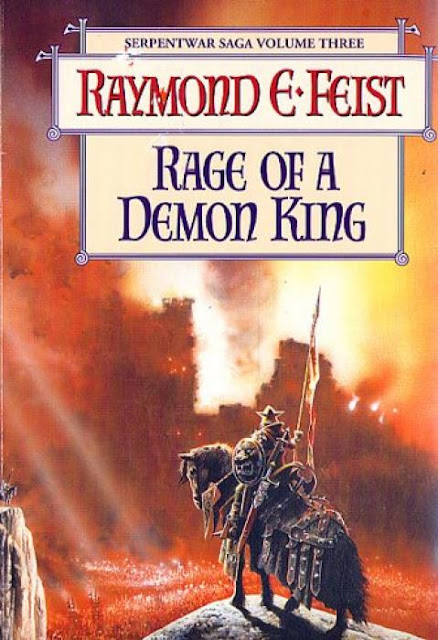I'm not sure when my sensibilities toward reading things changed, but somewhere along the line of reading this and that, when I came across something that desperately smacked of something else that I'd read, I started to think, "This is actually a brilliant piece of fanfiction and they must have loved this author a lot. I do like how they are filling in a bunch of stuff that I always craved more of."
Most recently, this happened while reading Dennis McKiernan's Silver Call duology. This author must have loved the Moria part of Tolkien's Fellowship of the Ring. And I honestly cannot blame him, because the trek through Moria is an exciting and memorable piece of that fantasy series, culminating with the fight versus the balrog over a cleft of doom.
Dennis McKiernan's fanfiction duology (published by Doubleday nonetheless back in the eighties) is almost a blow by blow account of Tolkien. The main character is a warrow, which is just a hobbit really. His name is Peregrine Fairhill and his servant is Cotton. They join a four-thousand strong army of dwarves wanting to reclaim an underground kingdom called Kraggen-Cor that lies underneath a range of towering mountains (sound familiar?) These ancient dwarven halls are teeming with things called Ruhks and maggot-folk, but these are just orcs and goblins. And their ancestors originally lost the ancient kingdom when the dwarves of old dug too greedily in the earth looking for starsilver and unleashed a terrible demon called a Gargon, that met its fate in a battle on a bridge that spans a bottomless crevasse. Yes, yes, it is all things we have seen before.
Even the entrance into Kraggen-Cor is lifted right from Tolkien. The ancient dwarven gate is on the side of a mountain and borders a deep and brooding lake filled with evil. Inside the lake is the Kraken-Ward, a hundred-tentacled thing that snatches dwarves up by the dozen and kills them swiftly with its powerful arms. You might ask, "How on earth did this thing get published?"
Well...it's actually good. You know, like Fifty Shades of Grey is just Twilight fan fiction, and it's actually pretty decent? The writing is as good as anything I'd read of Tolkien. And the author, though he lifts a ton from Tolkien, branches off on his own. For one, you get to spend a lot of time in Kraggen-Cor with a band that's making its way toward the gate next to the mire from the other side. Their trek through the endless dark of the ancient Dwarven Kingdom is filled with peril and discovery. Additionally, the author deals with threats in detail, satisfying a lot of questions that go unanswered in Tolkien's tale. For example, the author explains that this squid monster got to the lake because a long time ago, a powerful evil sorcerer named Modru (think Sauron) had a dragon snatch it from the ocean and drop it in the lake to stand guard over the West door so that his evil forces could rule in Kraggen-Cor.
And the dwarf army also deals with the squid monster by breaking the artificial dam that is responsible for the lake in the first place (using their stonecunning and tools), and once the water flows out, out flows the monster to crash onto the bottom of the cliff. Then they hurl boulders down on top of it until they crush it to death. I thought that was a rather nifty and clever solution.
So here's the thing: I think there's value in fan fiction. I wouldn't have said this twenty years ago, because I was caught up in youthful snobbery believing (still) that the only people who deserve to get published are people with original ideas. But I've let go of that nonsense, realizing that publishing is just a business, and decisions on what deserves the light of day and what doesn't all seems to boil down to money. Educated liberals would probably decry me of this opinion, but in doing so I think they are wrong. I rather enjoyed Dennis McKiernan's fan service to Tolkien, and I thought his characters were very well-developed, as was all the Dwarvish language he went to the trouble of mapping out in an appendix to the series. I think we can spend too much time and effort looking down our noses at a piece of art and decrying it as a "knock off," without appreciating the fine nuances that make it sparkle in ways that the original did not. And that's all I have to say on that.












